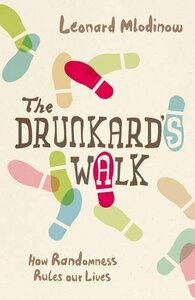Take a photo of a barcode or cover
informative
slow-paced
There was a lot I liked here. Interesting examples of the role of randomness in our lives abounded. But I wasn't a huge fan of how the author slowly introduced basic statistical concepts one by one, surrounded by historical and biographical information about the originator. The author tried to appeal to readers with no knowledge of math or statistics whatsoever, which made some sections feel like a waste of my time (~20 pages to explain "law of large numbers," "normal distribution," etc). Still, the good outweighed the bad. There were some examples of typical randomness that were so compelling you might even change the way you think.
adventurous
funny
hopeful
informative
inspiring
lighthearted
fast-paced
Such an interesting book! When I picked it up, I didn't expect it to pretty much be a history of probability and statistics, and it initially bummed me out upon realizing that, but I ended up really loving it!
Mlodinov is such an amazing story teller, sprinkling interesting little anecdotes throughout the book to keep the reader engaged.
The stories of mathematicians and statisticians he shared made me feel so inspired. It made me feel like there are still so many amazing things left to be discovered in the mathematical sciences, and I found that encouraging.
I found this book so quote-worthy, and a wonderfully charming historical account of the statistical sciences that's accessible to any readers interested in the topic. I will definitely be keeping a copy for myself to read again in the future, and I will highly recommend it to my science and math loving friends.
Mlodinov is such an amazing story teller, sprinkling interesting little anecdotes throughout the book to keep the reader engaged.
The stories of mathematicians and statisticians he shared made me feel so inspired. It made me feel like there are still so many amazing things left to be discovered in the mathematical sciences, and I found that encouraging.
I found this book so quote-worthy, and a wonderfully charming historical account of the statistical sciences that's accessible to any readers interested in the topic. I will definitely be keeping a copy for myself to read again in the future, and I will highly recommend it to my science and math loving friends.
Moderate: Genocide, Torture, Schizophrenia/Psychosis , Pandemic/Epidemic
adventurous
informative
reflective
medium-paced
I enjoy reading books like these -- works that attempt to explain, in layperson's terms, complex scientific concepts. In this case, the author does an excellent job of explaining the basics of probability and statics and then showing how they do (or don't) apply to our daily lives.
While the gist of his argument is laid out in the last chapter, the ride is fun. My favorite two examples:
The Monty Hall Problem: Imagine you are on the games showet's Make a Deal and you have to choose a fabulous prize that is behind one of three curtains. You choose Curtain A, and the host, Monty Hall, pulls back Curtain C to reveal one of two dud prize. The question -- at this point, should you change to Curtain B, or stay with Curtain A? Switching will actually increase your odds.
Odds of Having Two Girls: Let's say you have a distant acquaintance that you know has two children, one of which is a girl. What are the odds that both children are girls? 1 in 3. But what if you knew that this acquaintance had a girl named Florida. Does that change the odds that both children are girls? Amazingly, yes!
Amongst all this are several short tidbits about the development of the probability and statistical methodologies that have been used to try and predict our random lives. Mlodinow has an engaging writing style that I enjoyed. I can't pretend that I understood every concept, but I was able to follow pretty easily. For the topic, there's very little actual math in this book.
While the gist of his argument is laid out in the last chapter, the ride is fun. My favorite two examples:
The Monty Hall Problem: Imagine you are on the games show
Odds of Having Two Girls: Let's say you have a distant acquaintance that you know has two children, one of which is a girl. What are the odds that both children are girls? 1 in 3. But what if you knew that this acquaintance had a girl named Florida. Does that change the odds that both children are girls? Amazingly, yes!
Amongst all this are several short tidbits about the development of the probability and statistical methodologies that have been used to try and predict our random lives. Mlodinow has an engaging writing style that I enjoyed. I can't pretend that I understood every concept, but I was able to follow pretty easily. For the topic, there's very little actual math in this book.
The book is written in an entertaining manner. Some of the stories described were rather absorbing. One gets a glimpse of the lives of some of the famous mathematicians and/or gamblers and how statistics developed over time. Although, there are parts of a few chapters where it gets mathematics(statistics) intensive and a little bit of knowledge/curiosity would make the book entertaining.
With a brief explanation of the role of randomness and luck in everyday life makes one feel discouraged and hopeful at the same time. Discouraged to know that one does not really have control over the future. Also, it gets compounded by knowing that humans are not skilled to recognize the best outcome path in the wake of a situation. Hopeful to know that, good things could be on the way and the skill can be improved over time and practice. As the author states, the bright side of it is that we can change the way we perceive the events and make the best of it.
With a brief explanation of the role of randomness and luck in everyday life makes one feel discouraged and hopeful at the same time. Discouraged to know that one does not really have control over the future. Also, it gets compounded by knowing that humans are not skilled to recognize the best outcome path in the wake of a situation. Hopeful to know that, good things could be on the way and the skill can be improved over time and practice. As the author states, the bright side of it is that we can change the way we perceive the events and make the best of it.
informative
reflective
medium-paced
Read on a recommendation. As I will have to be taking statistics in graduate school, this was a fun intro to the subject. I like his choice of stories to illustrate mathematical points (perhaps a little more than the points themselves). Overall, good read (though it does take a little bit of time to read for us non-mathematical types).
This book covered many interesting themes in decision-making theory, probability and statistics. Although the theoretical treatment of these subjects was not particularly thorough, the author wove them together by telling the stories of the lives of the theorists.
I was repeatedly amazed by how certain ways of thinking that seem "obvious" today (eg. averaging result of multiple samples) were so unintuitive when they were first presented to the world. It was fascinating to learn about the circumstances under which these breakthroughs occurred. If you're interested in revisiting the themes of Thinking Fast Slow and other works on the limits of human reasoning through a historical lens, I would recommend this book.
I was repeatedly amazed by how certain ways of thinking that seem "obvious" today (eg. averaging result of multiple samples) were so unintuitive when they were first presented to the world. It was fascinating to learn about the circumstances under which these breakthroughs occurred. If you're interested in revisiting the themes of Thinking Fast Slow and other works on the limits of human reasoning through a historical lens, I would recommend this book.
funny
informative
medium-paced


